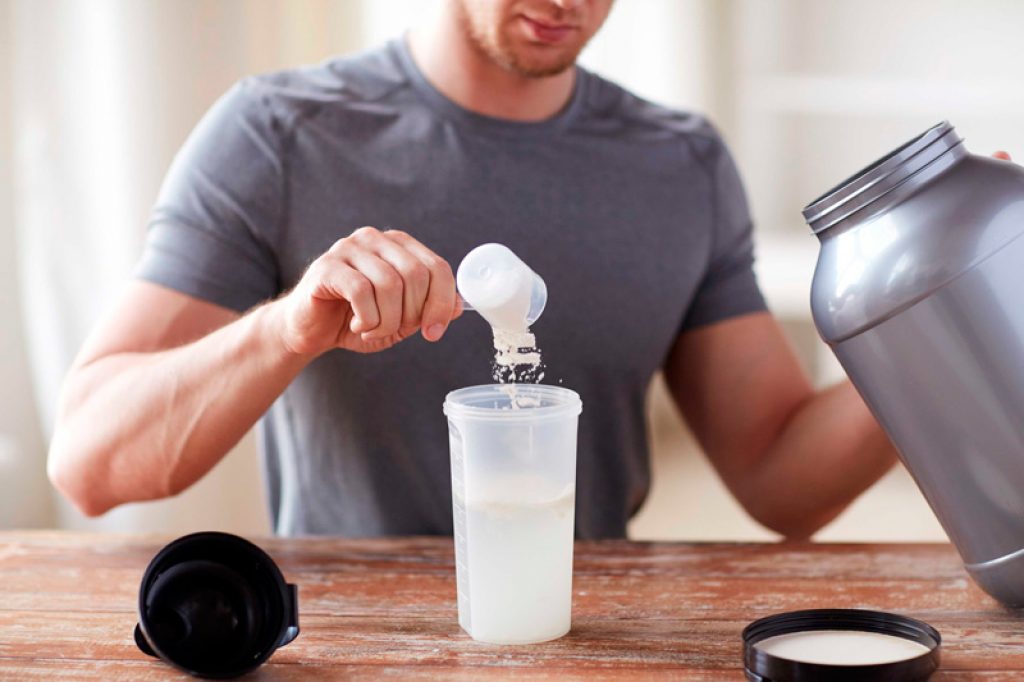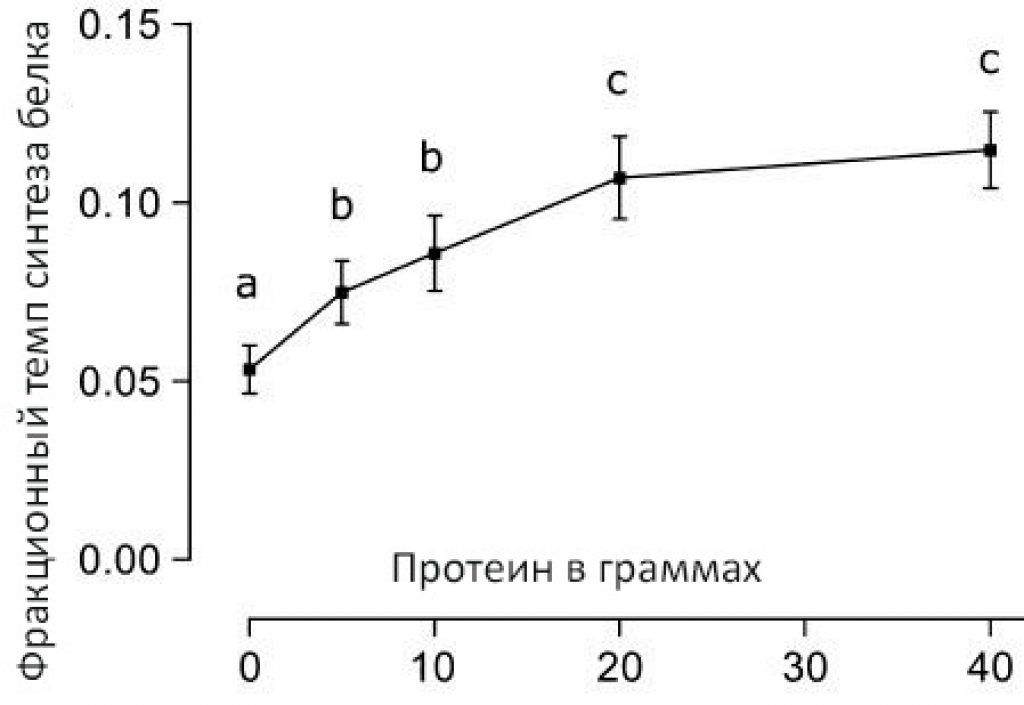How to drink protein to gain muscle mass
So, you have acquired a quality whey protein - and what's next? And the question arises, how to take protein to gain muscle mass, at what time and how many times?
I run into this all the time. People buy protein powder with no idea how to take it properly. Most often, most of them are guided by the phrase "the more the better" and take more than they should.
The results of this excessive consumption of the powder can be digestive problems and bloating, as well as a good financial outlay.
To get started, read and why it is needed.
So, in my post, I am going to tell you how to take protein for muscle mass in order to get the most out of your whey protein shake, when and how much to take it!
Before we tell you when to take, let's talk about how much.
Your muscles are in a state of constant synthesis and breakdown of muscle proteins. Muscle growth will begin only when the synthesis process is more intense than the splitting process. This state is called positive protein balance, and it is the process by which muscle grows.
Lifting weights increases protein synthesis, but only when enough amino acids are present in your diet, which help the synthesis process to prevail over breakdown, and this leads to muscle hypertrophy. Whey protein is the highest quality product, a source of protein of high biological value, which is rich in amino acids that contribute to muscle building.
How much protein is needed for optimal muscle growth?

A number of scientific studies have been conducted to find out how different doses of protein affect the level of muscle protein synthesis.
In one such study, conducted by the Exercise Metabolism Research Group, Department of Kinesiology at McMaster University in Canada, a group of young adults performed intense resistance training with weights followed by an egg protein drink containing varying doses of protein (0.5, 10, 20 or 40 grams of protein).
The study found that maximum post-workout protein synthesis was achieved with 20g of protein. The difference between 20g and 40g was minimal, although as seen in the graph below, there was a slight increase in protein synthesis between the two doses.

In a similar UK study at the University of Stirling, the Health and Exercise Science Research Group used whey milk protein to look at skeletal muscle growth in response to different doses of protein after resistance exercise. The results were the same, there was no significant difference in the rate of protein synthesis between doses of 20 and 40 grams.
Intention: Volunteers (n=48) ate a standard, high-protein (0.54 g/kg body weight) breakfast. Three hours later, they completed a set of non-reversible exercises (8 x 10 leg presses and leg extensions, 80% one rep with max weight). Immediately after training (~10 minutes), the volunteers drank 0, 10, 20, and 40 grams of whey milk protein. The rate of myofibrillar muscle protein synthesis and the rate of whole body phenylalanine oxidation and urea production after absorption of the substance was measured for 4 hours after ingestion of the drink by continuous administration of labeled atoms labeled as [ 13 C 6 ] phenylalanine and [ 15 N 2 ] urea.
Results: Myofibrillar muscle protein synthesis increased (Protein< 0.05) на 49% (± стандартное отклонение) при дозе сывороточного белка выше 0 г. и на 56% при дозах сывороточного белка в 20 и 40 г, в то время как при дозе 10 г. особых изменений не наблюдалось (белок>0.05). Rates of phenylalanine oxidation and urea production increased with 40 g of whey protein.
Conclusion: 20 g of whey protein is sufficient to maximize the stimulation of the rate of myofibrillar muscle protein synthesis in young people weighing about 80 kg who performed resistance exercises. The dose of whey protein is more than 20 gr. stimulates amino acid oxidation and urea production. This trial is registered at: http://www.isrctn.org/ as ISRCTN92528122.
I know what some of you are thinking at this moment.
"But I've seen professional bodybuilders eat way more than 40 grams of protein per meal."
This is true, as well as the fact that professional bodybuilders take a large amount of anabolic steroids. Combine training with steroids and there will be a dramatic increase in protein synthesis. Their protein synthesis is much faster than that of ordinary weightlifters.
Bottom line: how much protein to take

Based on the research above, 20 to 40 grams of whey protein is enough to maximize muscle protein synthesis. So, if, for example, your whey protein contains 16 grams of protein in a scoop, 32 g will be the optimal dose for you, and the excess will not affect your synthesis in any way, which cannot be said about your wallet.
It's time to stop drinking 4-5 scoops per shake. As these studies show, there is no need to make shakes with more than 40 g of protein, even after a workout.
Now that you know the optimal dose of whey protein per serving, let's move on to the second question, namely when during the day it is best to drink your shakes.
1: Protein in the morning before meals or after
Can you drink protein in the morning? To answer this question, let's figure out what you need to eat in the morning. Basically, I imagine bodybuilders who cook themselves different dishes from eggs in the morning. Omelet, fried eggs, poached eggs and boiled eggs are the highest quality protein source. But I need something quicker and easier after sleep that will provide the same amount of protein as regular cooking.
Whey Protein Shake is a quick, easy and delicious source of protein for breakfast.
The first thing you should do in the morning is to drink a protein shake, since these early hours are considered the most suitable time of day to drink protein in the morning, because while you were sleeping, the body was without food for 7 to 9 hours. In order to maintain a positive protein balance, it is essential to supply the body first thing in the morning with a highly biological and rapidly digestible source of protein. Whey protein is the ideal solution.
A bowl of oatmeal, muesli, or buckwheat with a protein shake is a healthy breakfast for muscle growth.
2: Protein Pre-Workout
Drinking a protein shake before a workout is certainly healthy, but it's really not really necessary.
If you had a full meal of lean protein and carbohydrates 2 hours before your workout, then you don’t need to drink a pre-workout shake because you will have enough nutrients in your body that will supply you with the energy you need for training and reduce muscle breakdown. squirrel.
However, if you're short on time or it's been 3 hours or more since you ate, then it's a good idea to have a protein shake before your workout. It ensures that there are enough amino acids in the body, which will reduce the breakdown of muscle protein during training and will help the recovery process after training.
3: Protein After Workout
When it comes time to "fill" yourself with protein, there is no better time to do it than after a workout. Any training stimulates the synthesis and breakdown of muscle protein. Without enough post-workout protein, protein synthesis will not exceed the breakdown process, which means your workout was wasted in terms of muscle growth.
After a workout, muscles are in an anabolic state for approximately 48 hours. The first two hours of this anabolic state are when your muscles are most sensitive to amino acids from protein intake. Any protein intake during this 48-hour period will be used for recovery and growth, but maximum protein synthesis is achieved within the first two hours after training.
It is best to take whey protein immediately after your workout to ensure maximum muscle growth.
This period of time is sometimes referred to as the "post-workout window" and the best way to make the most of this time is to consume a high quality, fast absorbing protein such as whey.
The body's need for protein after a workout is very high, as the muscles urgently need it for the processes of recovery and growth.
Other times of the day as part of a meal:
Throughout the day, it's best to eat healthy whole foods and vary your protein sources. However, you can replace one of your daily meals with a protein shake with carbohydrates, and if your schedule does not allow you to snack on a normal meal, then a protein shake will come in handy.
Before bedtime
Drinking a protein shake before bed is a good way to supply your muscles with amino acids while you sleep and prevent muscle protein breakdown. And you should also drink a shake before bed after a hard day of training to get the maximum protein synthesis during the 48-hour period after training.
If you decide to drink a cocktail before bed, try casein instead of whey. Casein protein turns into a gel in the stomach. The gel-like consistency of casein slows down the rate of digestion and absorption, as a result of which the amino acids necessary for muscle growth are slowly and steadily released into the bloodstream throughout the night.
You now have a short guide on how much whey protein to take and when. You should drink protein shakes only when there is a reasonable need for them, namely 2 to 3 times a day. In the morning, after training and as part of one of the meals.






